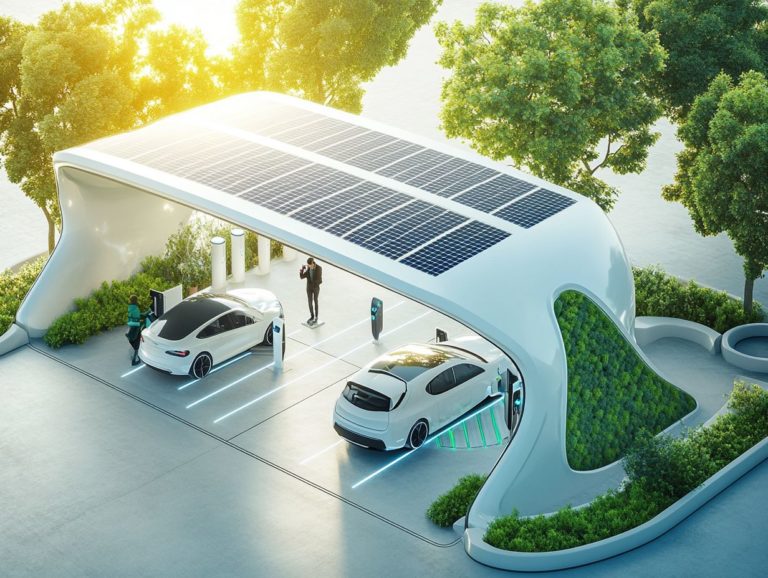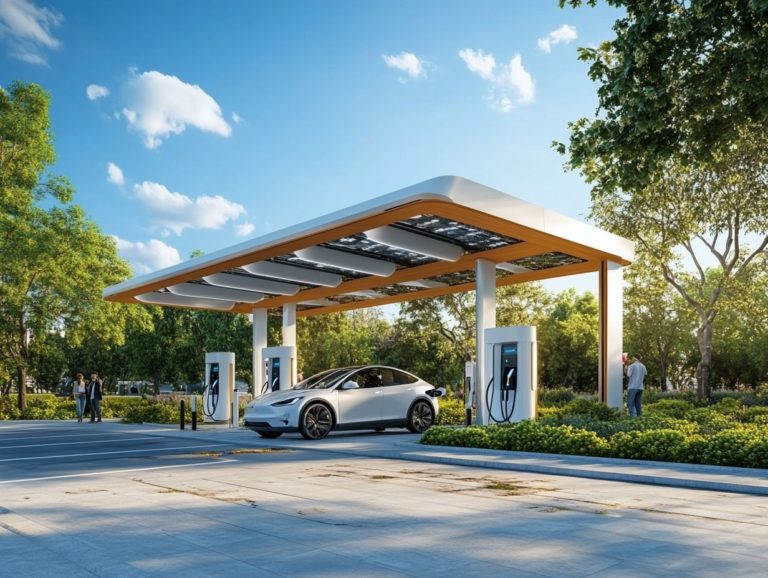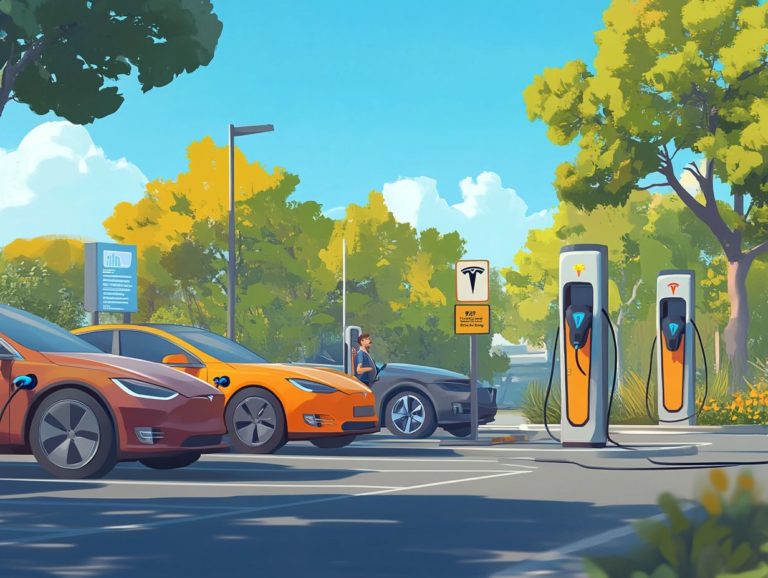Installing a Home EV Charger: What to Know
As electric vehicles (EVs) gain popularity, you might consider installing a home EV charger. This makes charging easy and can save you money over time.
You ll discover various charger types and their benefits. Consider key factors before making your installation choice.
You will also learn essential tips for maintaining your charger and how to prepare for future technology needs. Dive in to make your home EV-ready!
Contents
- Key Takeaways:
- Benefits of Installing a Home EV Charger
- Types of Home EV Chargers
- Factors to Consider Before Installation
- Steps for Installing a Home EV Charger
- Maintaining and Upgrading Your Home EV Charger
- Frequently Asked Questions
- 1. What is an EV charger and why would I need to install one in my home?
- 2. How do I choose the right EV charger for my home?
- 3. Do I need a professional to install my home EV charger?
- 4. What are the potential costs associated with installing a home EV charger?
- 5. Are there any permits or regulations I need to be aware of when installing a home EV charger?
- 6. Can I use my home EV charger for other electrical devices?
Key Takeaways:
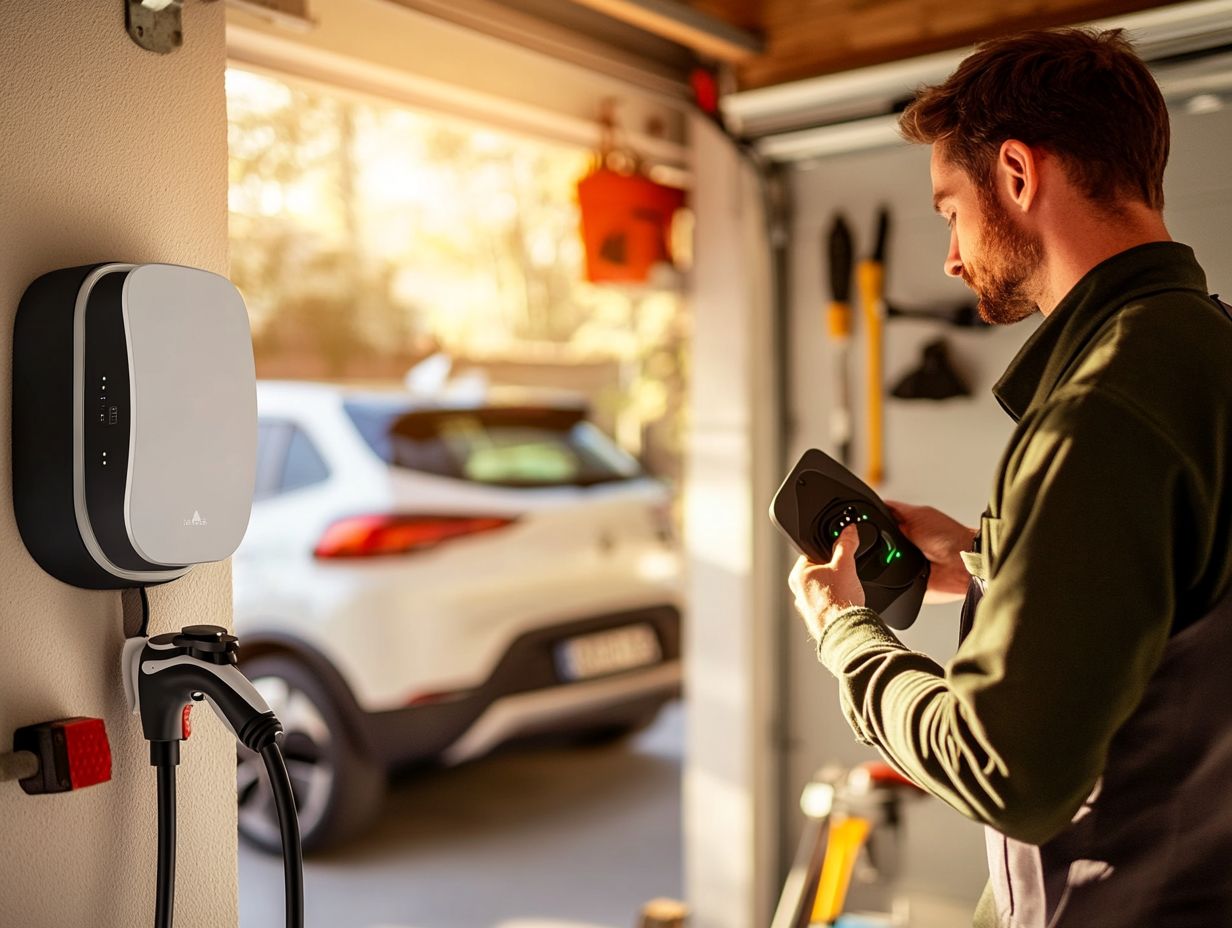
- Installing a home EV charger offers convenience and cost savings, making it a smart choice for electric vehicle owners.
- Before installation, consider your electrical capacity and compatibility to ensure a successful and safe setup.
- Maintain your home EV charger for long-term use and keep in mind future upgrades for optimal performance and continued cost savings.
What is an EV Charger?
An EV charger is a device that supplies electricity to electric vehicles (EVs), like the Tesla Model 3. These chargers come in various types, each offering different levels of charging speed and efficiency. As a homeowner, you can effortlessly charge your electric car at home, choosing between Level 1 chargers that plug into standard household outlets and Level 2 chargers that require a dedicated 240-volt outlet for a quicker charge. Understanding these options is key, as they can significantly influence your charging times, efficiency, and overall convenience.
For example, Level 3 chargers, often referred to as DC fast chargers, can quickly replenish an electric vehicle’s battery, making them perfect for public charging stations. The technology behind these stations uses advanced power management to optimize the charging process, ensuring your vehicle receives the right voltage and current without risking battery damage.
Battery capacity is another vital factor in how fast your vehicle can recharge, as larger capacities demand more energy. You should carefully consider your specific vehicle model and daily driving habits when selecting the ideal charging solution, ensuring you invest in a system that perfectly aligns with your lifestyle and charging needs.
Benefits of Installing a Home EV Charger
Installing a home EV charger offers a wealth of benefits that can truly enhance your electric vehicle ownership experience. Imagine the unmatched convenience of charging your vehicle overnight, coupled with the knowledge gained from understanding the costs of installing chargers, freeing you from the hassle of frequent trips to public charging stations often accompanied by lengthy wait times and rising electric bills.
Having a home charging station can also boost your property s value and align you with sustainable transportation efforts, making it a wise investment for anyone eager to embrace green technology.
Convenience and Cost Savings
The convenience of having a dedicated home EV charger significantly reduces your reliance on public charging stations, leading to cost savings and improved charging efficiency. By charging overnight, you can take advantage of lower electricity rates, which not only reduces your electric bill but also ensures your electric vehicle is ready to hit the road each day. This approach saves you time and enhances the experience of owning an electric vehicle, minimizing the hassles of charging on-the-go.
With smart charging technology, you can further optimize your charging schedule based on real-time energy prices and demand. This maximizes efficiency and aligns perfectly with renewable energy use, allowing you to harness solar or wind-generated power when it s most plentiful. Over time, this savvy energy management can lead to noticeable reductions in your overall energy costs.
Incorporating these solutions enhances your daily routine with the convenience of charging at home while giving you control over your energy consumption. Ultimately, this transforms how you approach both mobility and energy use.
Types of Home EV Chargers
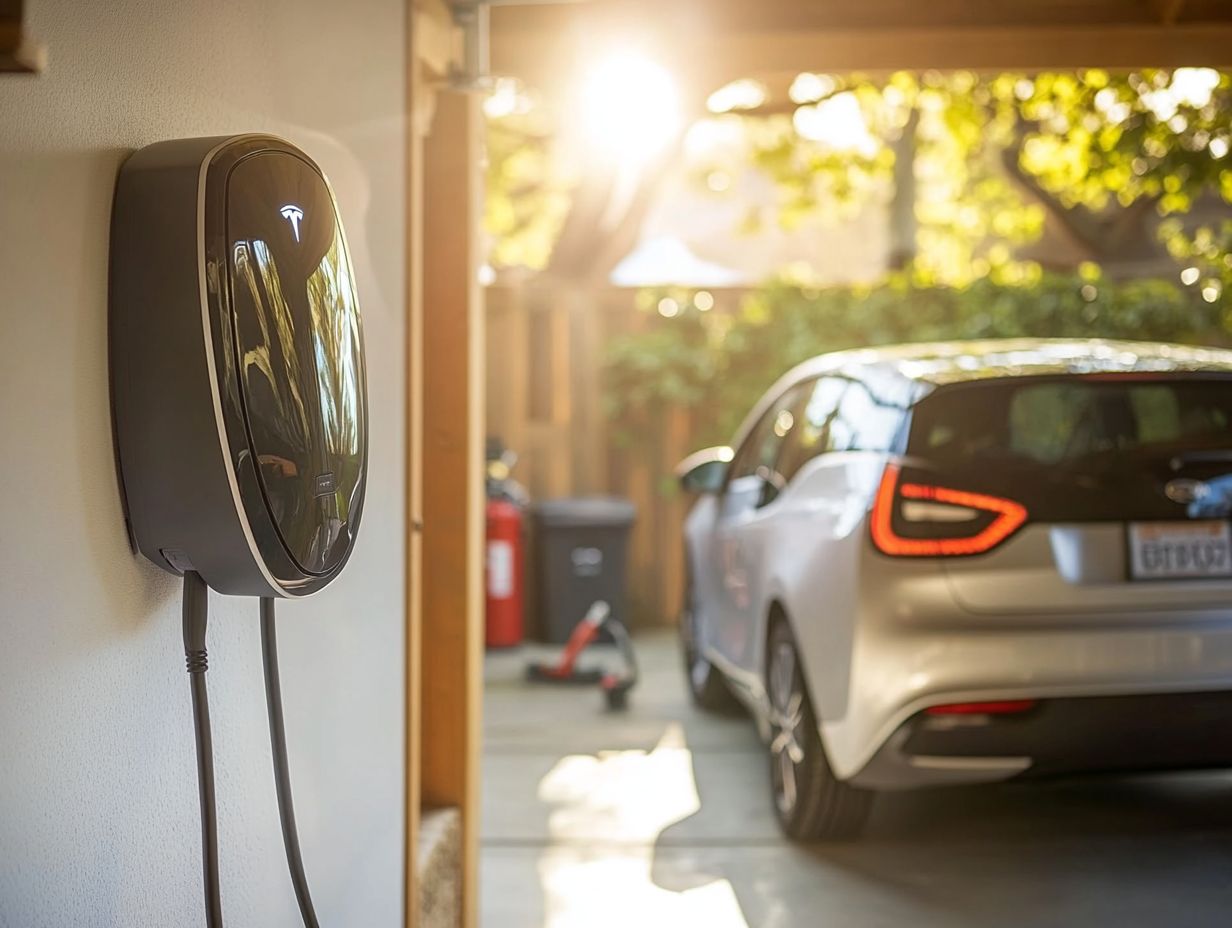
Home EV chargers are mainly of two types: Level 1 and Level 2 chargers. Each type offers unique charging speeds and convenience.
Level 1 chargers plug into standard household outlets. They are perfect for overnight charging and provide a slower charging rate.
Level 2 chargers use outlets that can handle more power. They charge significantly faster, making them ideal for those with busy lifestyles.
Level 1 vs Level 2 Chargers
Understanding the differences between Level 1 and Level 2 chargers is essential. Key factors include charging speed, installation needs, and efficiency.
A Level 1 charger offers about 4-5 miles of range per hour. This makes it great for shorter daily commutes.
In contrast, Level 2 chargers provide 10 to 60 miles of range per hour. This is a game-changer for longer drives!
Installation differs as well. Level 2 chargers usually require professional installation due to electrical upgrades.
If you prefer convenience and low upfront costs, Level 1 might be appealing. However, for fast and reliable charging, Level 2 chargers are the way to go.
Factors to Consider Before Installation
Before installing a home EV charger, assess your electrical system. This step is crucial for compatibility and performance.
Consult a licensed electrician. They will help evaluate wiring requirements and ensure compatibility with your home’s system.
Electrical Capacity and Compatibility
Understanding electrical capacity is vital for safety and efficiency. Assess your electrical system with a licensed electrician to see if it can handle a Level 2 charger.
You might need an upgrade to meet the power demands of charging electric vehicles and stay compliant with safety standards.
Look beyond just the electrical panel. Consider wiring and circuit configurations throughout your home for optimal performance.
Discuss any future plans for additional electric vehicles or high-demand appliances with your electrician. This can help avoid costly modifications later.
Ensuring your electrical system is compatible with your EV charger is vital. It maximizes efficiency and provides a seamless charging experience.
Steps for Installing a Home EV Charger
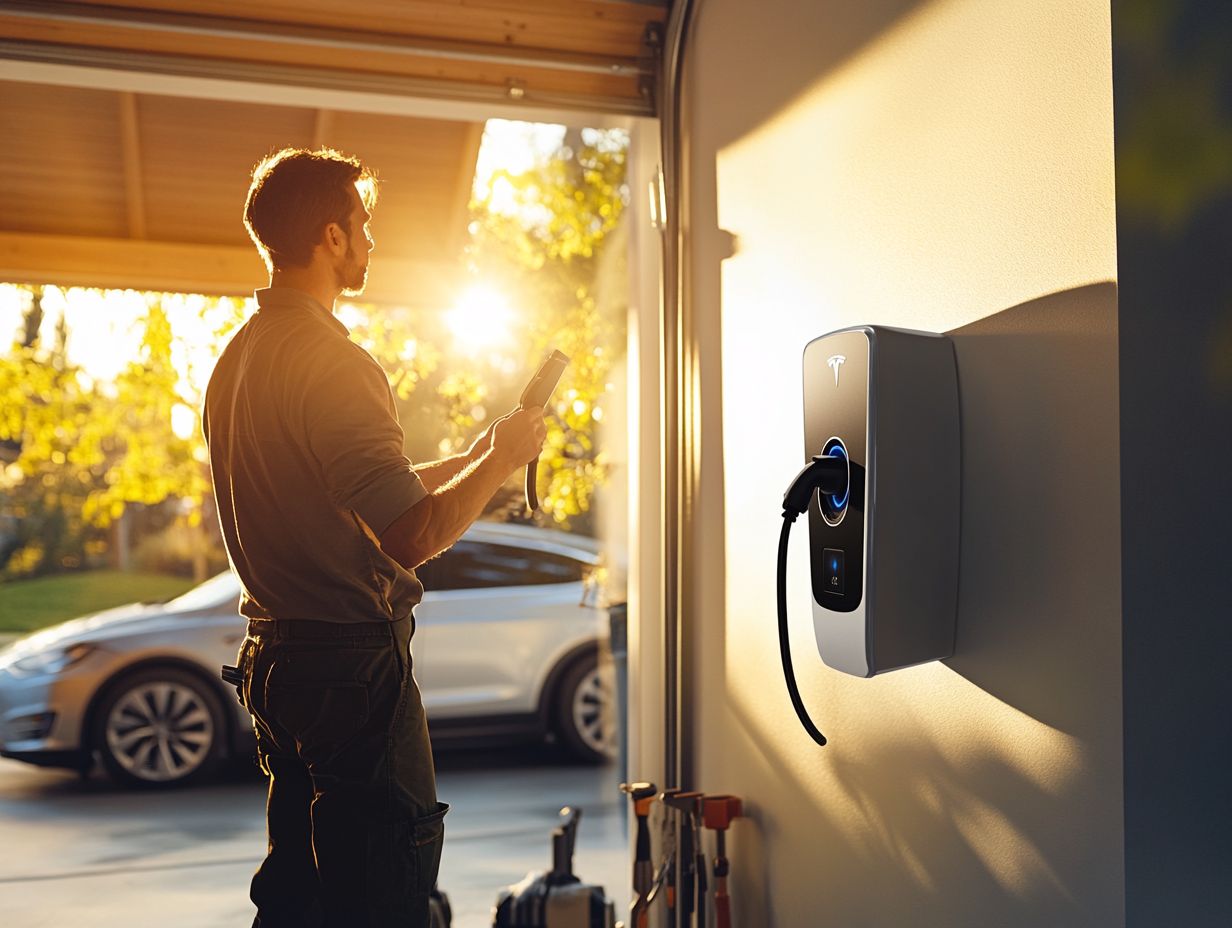
The installation process for a home EV charger involves several essential steps to ensure a safe and efficient setup. First, you’ll need to obtain the necessary permits based on local regulations and the type of EV charger you choose. Additionally, consider what to consider when installing a charger and hire a licensed electrician to handle the wiring installation, ensuring that the charging station connects seamlessly to your home’s electrical system without compromising safety or efficiency.
By grasping these steps, you can navigate the installation process smoothly while adhering to all safety requirements.
Permits and Professional Installation
Obtaining the necessary permits and hiring a professional to install your home EV charger are essential steps for compliance with local regulations. Familiarize yourself with the permit requirements in your area, which may involve submitting detailed plans for review. Additionally, understanding the benefits of home EV charging solutions can help you make informed decisions. Working with a licensed electrician streamlines the process and ensures that all electrical work meets safety codes.
Navigating the permitting process might feel overwhelming, but recognizing its significance is key to a successful installation. Each locality has specific regulations designed to uphold safety and efficiency. Failing to comply could lead to fines or the hassle of costly rework.
As you embark on this installation journey, your electrician will handle the permits and inspections, making the process easier for you. This support ensures that your charging station operates safely and effectively, paving the way for a smooth transition to electric vehicle ownership.
Maintaining and Upgrading Your Home EV Charger
Maintaining and upgrading your home EV charger is crucial for ensuring optimal charging efficiency and extending the lifespan of your device. Regular maintenance should include inspecting the wiring for wear and tear, checking connections, and ensuring the charging station is clear of debris.
As technology evolves, consider upgrading to newer models that provide enhanced safety features, faster charging speeds, or improved WiFi connectivity. These advancements can significantly elevate your user experience and meet the increasing demands of electric vehicles.
Tips for Long-Term Use and Future Upgrades
For long-term use and effective upgrades of your home EV charger, consider implementing a few strategic tips that align with evolving technology and your usage needs. Establish a routine of regular checks and maintenance to prevent unexpected downtime and ensure your charger consistently meets the demands of your household.
Staying informed about the latest technology trends in EV charging such as faster charging times and smart features that optimize energy consumption is crucial. As electric vehicle models continue to advance with increased battery capacities and sophisticated functionalities, knowing when to upgrade your charging system can significantly enhance your driving experience.
Thoughtful planning for future vehicles improves efficiency and influences your choice of charger now, allowing you to adapt seamlessly as new options become available.
Frequently Asked Questions
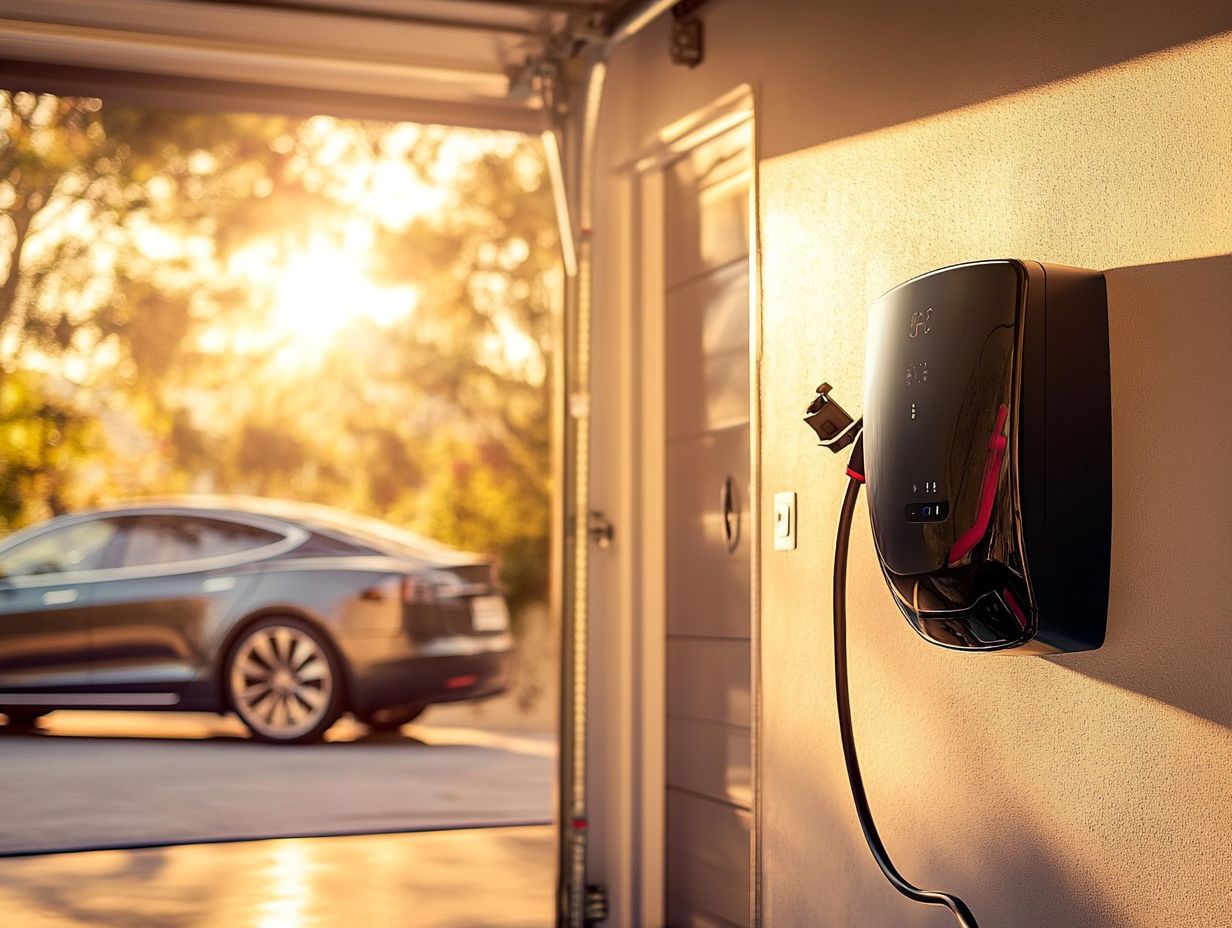
1. What is an EV charger and why would I need to install one in my home?
An EV charger, or electric vehicle charger, is a device that allows you to charge your electric car at home. If you have an electric car or are planning to get one, installing a home EV charger is essential for a reliable and convenient way to charge your vehicle.
Don t wait check your charger regularly to keep it running smoothly! Get ready to enjoy the convenience of electric vehicle ownership!
2. How do I choose the right EV charger for my home?
Choosing an EV charger involves a few key factors. Think about your car’s charging capabilities, the speed you need, and where to place the charger in your home.
It’s wise to talk to an expert to find a charger that fits your vehicle model.
3. Do I need a professional to install my home EV charger?
Some EV chargers come with DIY instructions. However, hiring a professional is highly recommended.
This ensures your charger is safely connected to your home’s electrical system.
4. What are the potential costs associated with installing a home EV charger?
Installation costs can vary based on the charger model and labor fees. For a clearer picture of expenses, get a quote from a professional.
5. Are there any permits or regulations I need to be aware of when installing a home EV charger?
Permit requirements differ by location. Check with local authorities and your homeowner’s association to make sure you comply with regulations.
6. Can I use my home EV charger for other electrical devices?
Using your home EV charger for other devices is not recommended. It’s specifically designed for electric vehicles.
Using it for other purposes could damage the charger or your devices.

